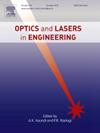使用基于光纤的法布里-珀罗干涉仪的血压测量系统
IF 3.5
2区 工程技术
Q2 OPTICS
引用次数: 0
摘要
在这项工作中,对基于光纤法布里-珀罗干涉仪(FFPI)的血压(BP)系统的开发进行了研究。开发的系统由两个主要部分组成:FFPI 结构和传感探头。感测探头的反射镜和弹性材料分别是镀铝镜和乳胶薄膜。此外,还采用了峰值检测和条纹计数技术,将条纹数转换为血压和心率值。此外,还使用标准数字血压计作为参照仪器,以比较 FFPI 传感器的性能。我们选择了 86 名年龄在 21-50 岁之间的志愿者来收集实验数据。不过,传感探头被放置在志愿者的颈部右侧,而标准数字血压计被放置在志愿者的左上臂。结果表明,所开发的系统能够测量收缩压(SBP)和舒张压(DBP),范围分别为 91 至 128 毫米汞柱和 62 至 85 毫米汞柱。此外,还测量了心率(HR),范围为 48 至 102 次/分钟。通过将实验结果与参考仪器进行比较,发现血压测量的平均百分比误差为 2.84%。此外,所开发传感器的灵敏度为 56.88 nm/mmHg。这意味着所开发的系统具有测量生命体征和血压的效率,且无需袖带、成本低廉、无创。本文章由计算机程序翻译,如有差异,请以英文原文为准。
A blood pressure measurement system using fiber optic-based Fabry-Perot interferometer
In this work, the development of a blood pressure (BP) system based on a fiber optic Fabry-Perot interferometer (FFPI) has been investigated. The developed system is consisted of 2 main parts: FFPI structure, and sensing probe, respectively. An aluminum-coated mirror and latex thin film have been used as a reflector and elastic material of the sensing probe. Moreover, the peak detection and also fringe counting techniques have been applied to convert the number of fringes to blood pressure and heart rate values. In addition, a standard digital sphygmomanometer has been utilized as a reference instrument for comparing the performance of FFPI sensor. Eighty-six volunteers aged 21 - 50 years old have been chosen to collect the experimental data. However, the sensing probe has been placed on right side of the neck, and a standard digital sphygmomanometer on the upper left arm of the volunteers. The results indicated that the developed system has ability to measure systolic blood pressure (SBP), and diastolic blood pressure (DBP) in the range of 91 to 128 mmHg, and 62 to 85 mmHg, respectively. Moreover, the heart rate (HR) has also been exploited in the range of 48 to 102 beats/min. By comparing the experimental results with the reference instrument, it found that the average percentage error from the blood pressure measurements is 2.84 %. Furthermore, the developed sensor has a sensitivity of 56.88 nm/mmHg. This implies that the developed system has the efficiency to measure vital signs and blood pressure with cuffless, low-cost, and non-invasive.
求助全文
通过发布文献求助,成功后即可免费获取论文全文。
去求助
来源期刊

Optics and Lasers in Engineering
工程技术-光学
CiteScore
8.90
自引率
8.70%
发文量
384
审稿时长
42 days
期刊介绍:
Optics and Lasers in Engineering aims at providing an international forum for the interchange of information on the development of optical techniques and laser technology in engineering. Emphasis is placed on contributions targeted at the practical use of methods and devices, the development and enhancement of solutions and new theoretical concepts for experimental methods.
Optics and Lasers in Engineering reflects the main areas in which optical methods are being used and developed for an engineering environment. Manuscripts should offer clear evidence of novelty and significance. Papers focusing on parameter optimization or computational issues are not suitable. Similarly, papers focussed on an application rather than the optical method fall outside the journal''s scope. The scope of the journal is defined to include the following:
-Optical Metrology-
Optical Methods for 3D visualization and virtual engineering-
Optical Techniques for Microsystems-
Imaging, Microscopy and Adaptive Optics-
Computational Imaging-
Laser methods in manufacturing-
Integrated optical and photonic sensors-
Optics and Photonics in Life Science-
Hyperspectral and spectroscopic methods-
Infrared and Terahertz techniques
 求助内容:
求助内容: 应助结果提醒方式:
应助结果提醒方式:


